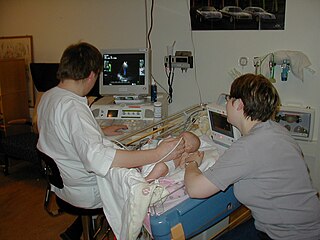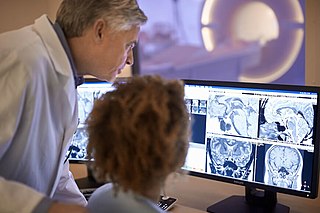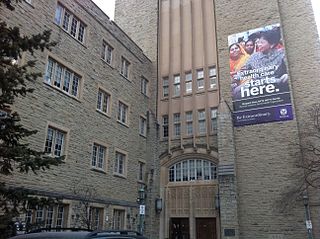
Medical ultrasound includes diagnostic techniques using ultrasound, as well as therapeutic applications of ultrasound. In diagnosis, it is used to create an image of internal body structures such as tendons, muscles, joints, blood vessels, and internal organs, to measure some characteristics or to generate an informative audible sound. The usage of ultrasound to produce visual images for medicine is called medical ultrasonography or simply sonography, or echography. The practice of examining pregnant women using ultrasound is called obstetric ultrasonography, and was an early development of clinical ultrasonography. The machine used is called an ultrasound machine, a sonograph or an echograph. The visual image formed using this technique is called an ultrasonogram, a sonogram or an echogram.

Radiology is the medical specialty that uses medical imaging to diagnose diseases and guide their treatment, within the bodies of humans and other animals. It began with radiography, but today it includes all imaging modalities, including those that use no ionizing electromagnetic radiation, as well as others that do, such as computed tomography (CT), fluoroscopy, and nuclear medicine including positron emission tomography (PET). Interventional radiology is the performance of usually minimally invasive medical procedures with the guidance of imaging technologies such as those mentioned above.

Echocardiography, also known as cardiac ultrasound, is the use of ultrasound to examine the heart. It is a type of medical imaging, using standard ultrasound or Doppler ultrasound. The visual image formed using this technique is called an echocardiogram, a cardiac echo, or simply an echo.
Health technology is defined by the World Health Organization as the "application of organized knowledge and skills in the form of devices, medicines, vaccines, procedures, and systems developed to solve a health problem and improve quality of lives". This includes pharmaceuticals, devices, procedures, and organizational systems used in the healthcare industry, as well as computer-supported information systems. In the United States, these technologies involve standardized physical objects, as well as traditional and designed social means and methods to treat or care for patients.

The Schulich School of Medicine and Dentistry is the combined medical school and dental school of the University of Western Ontario, a public university in London, Ontario, Canada
Emergency ultrasound employing point-of-care ultrasound (POCUS) is the application of ultrasound at the point of care to make immediate patient-care decisions. It is performed by the health care professional caring for the injured or ill persons. This point-of-care use of ultrasound is often to evaluate an emergency medical condition, in settings such as an emergency department, critical care unit, ambulance, or combat zone.
Imaging informatics, also known as radiology informatics or medical imaging informatics, is a subspecialty of biomedical informatics that aims to improve the efficiency, accuracy, usability and reliability of medical imaging services within the healthcare enterprise. It is devoted to the study of how information about and contained within medical images is retrieved, analyzed, enhanced, and exchanged throughout the medical enterprise.
Cardiothoracic anesthesiology is a subspeciality of the medical practice of anesthesiology, devoted to the preoperative, intraoperative, and postoperative care of adult and pediatric patients undergoing cardiothoracic surgery and related invasive procedures.

Artificial intelligence in healthcare is the application of artificial intelligence (AI) to copy human cognition in the analysis, presentation, and understanding of complex medical and health care data. It can also augment and exceed human capabilities by providing faster or new ways to diagnose, treat, or prevent disease. Using AI in healthcare has the potential improve predicting, diagnosing and treating diseases. Through machine learning algorithms and deep learning, AI can analyse large sets of clinical data and electronic health records and can help to diagnose the disease more quickly and precisely.

Shinjini Kundu is an Indian American physician and computer scientist at Washington University in St. Louis School of Medicine in St. Louis, Missouri. Her research focuses on designing artificial intelligence systems to detect diseases that may be imperceptible to humans. She was named one of Forbes 30 under 30, MIT Technology Review's 35 innovators under 35, a World Economic Forum Young Global Leader, and a winner of the Carnegie Science Award.

Christian Guttmann is an entrepreneur, business executive and scientist in Artificial Intelligence, Machine Learning and Data Science. He has three citizenships. He is currently the vice president in Engineering and Artificial Intelligence at Pegasystems, and leads the AI research and development including the development of Large Language Models and Generative AI. He is an adjunct associate professor at the University of New South Wales, Australia and Adjunct researcher at the Karolinska Institute, Sweden. Guttmann has edited and authored 7 books, over 50 publications and 4 patents in the field of Artificial Intelligence. He is a keynote speaker at international events, including the International Council for Information Technology (ICA) in Government Administration and CeBIT and is cited by MIT Sloan Management review and Bloomberg.

Shelby Kutty is an Indian-born American cardiologist, a professor of pediatrics and internal medicine at the Johns Hopkins University School of Medicine. He holds the Helen B. Taussig endowed professorship at Johns Hopkins and is Director of the Helen B. Taussig Heart Center and the chair of Cardiovascular Analytic Intelligence Initiative at Johns Hopkins Hospital. He currently serves as the editor of American Journal of Physiology: Heart and Circulatory Physiology and Cardiology in the Young and as consulting editor for the Journal of Clinical Investigation. Prior to this, he held the title of assistant dean for research and development and vice chair of pediatrics at the University of Nebraska Medical Center College of Medicine. Kutty has published over 400 articles in peer-reviewed medical journals.

Merative L.P., formerly IBM Watson Health, is an American medical technology company that provides products and services that help clients facilitate medical research, clinical research, real world evidence, and healthcare services, through the use of artificial intelligence, data analytics, cloud computing, and other advanced information technology. Merative is owned by Francisco Partners, an American private equity firm headquartered in San Francisco, California. In 2022, IBM divested and spun-off their Watson Health division into Merative. As of 2023, it remains a standalone company headquartered in Ann Arbor with innovation centers in Hyderabad, Bengaluru, and Chennai.

The Artificial Intelligence of Things (AIoT) is the combination of artificial intelligence (AI) technologies with the Internet of things (IoT) infrastructure to achieve more efficient IoT operations, improve human-machine interactions and enhance data management and analytics.
The MIT Abdul Latif Jameel Clinic for Machine Learning in Health is a research center at the Massachusetts Institute of Technology (MIT) in the field of artificial intelligence (AI) and health sciences, including disease detection, drug discovery, and the development of medical devices. The MIT Jameel Clinic also supports the commercialization of solutions through grant funding, and has partnered with pharmaceutical companies, like Takeda and Sanofi, and philanthropies, like Community Jameel and Wellcome Trust, to forge collaborations between research and development functions and MIT researchers.
Carol Pearl Herbert is a Canadian family physician and researcher. She is a member of the National Academy of Medicine, Order of Canada, and Canadian Academy of Health Sciences.

Hutan Ashrafian is an academic, cardiothoracic surgeon, robotic surgeon, bariatric surgeon, computational biologist, immunologist, entrepreneur, historian, writer, martial artist and philosopher. He is the current chief scientific officer of Preemptive Health and Medicine at Flagship Pioneering.
Artificial intelligence in mental health is the application of artificial intelligence (AI), computational technologies and algorithms to supplement the understanding, diagnosis, and treatment of mental health disorders. AI is becoming a ubiquitous force in everyday life which can be seen through frequent operation of models like ChatGPT. Utilizing AI in the realm of mental health signifies a form of digital healthcare, in which, the goal is to increase accessibility in a world where mental health is becoming a growing concern. Prospective ideas involving AI in mental health include identification and diagnosis of mental disorders, explication of electronic health records, creation of personalized treatment plans, and predictive analytics for suicide prevention. Learning how to apply AI in healthcare proves to be a difficult task with many challenges, thus it remains rarely used as efforts to bridge gaps are deliberated.
Medical open network for AI (MONAI) is an open-source, community-supported framework for Deep learning (DL) in healthcare imaging. MONAI provides a collection of domain-optimized implementations of various DL algorithms and utilities specifically designed for medical imaging tasks. MONAI is used in research and industry, aiding the development of various medical imaging applications, including image segmentation, image classification, image registration, and image generation.

Rachel F. Brem is an American diagnostic radiologist, professor of radiology at the George Washington University School of Medicine & Health Sciences, and director of the Breast Imaging and Interventional Center at George Washington University’s Cancer Center. She previously served as director of Breast Imaging at Johns Hopkins. Brem develops novel technologies to better support early diagnosis and treatment of breast cancer. She is a fellow of the American College of Radiology and the Society of Breast Imaging.











